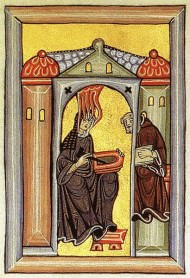Hildegard on Trial: A Note Regarding the Narrow Reception of a Medieval Abbess-Composer
DiCenso, Daniel
Marginalia, Vol. 5, (2007)
Abstract
Hildegard of Bingen, known widely after her death as the ‘Sybil of the Rhine’, was an abbess, composer, poet, herbalist, artist, scholar, mystic and visionary. During her lifetime (1098-1179), Hildegard produced major works of music, drama, and art alongside works of theology, literature, science and natural history. Known from Byzantium to England, Hildegard was of such stature in her own time that she was often called upon to advise all levels of ecclesiastical and secular authorities. Her letters to bishops, popes and kings demonstrate that Hildegard was deeply involved in affairs of church and state. Hildegard was also a first in many respects—she was the first to found a freestanding, all-women’s abbey, the first to identify the medicinal properties of certain plants and natural objects, and she remains the first musical composer whose biography is well preserved. By all standards, Hildegard was a remarkable person. But, like many women who lived in the Middle Ages, Hildegard was all but forgotten until rather recently, when academia became more interested in and open to women’s issues. Since her rediscovery, scholars in many fields have struggled to evaluate Hildegard’s place in history.
Hildegard on Trial: A Note Regarding the Narrow Reception of a Medieval Abbess-Composer
DiCenso, Daniel
Marginalia, Vol. 5, (2007)
Abstract
Hildegard of Bingen, known widely after her death as the ‘Sybil of the Rhine’, was an abbess, composer, poet, herbalist, artist, scholar, mystic and visionary. During her lifetime (1098-1179), Hildegard produced major works of music, drama, and art alongside works of theology, literature, science and natural history. Known from Byzantium to England, Hildegard was of such stature in her own time that she was often called upon to advise all levels of ecclesiastical and secular authorities. Her letters to bishops, popes and kings demonstrate that Hildegard was deeply involved in affairs of church and state. Hildegard was also a first in many respects—she was the first to found a freestanding, all-women’s abbey, the first to identify the medicinal properties of certain plants and natural objects, and she remains the first musical composer whose biography is well preserved. By all standards, Hildegard was a remarkable person. But, like many women who lived in the Middle Ages, Hildegard was all but forgotten until rather recently, when academia became more interested in and open to women’s issues. Since her rediscovery, scholars in many fields have struggled to evaluate Hildegard’s place in history.
Click here to read this article from Marginalia
Subscribe to Medievalverse
Related Posts